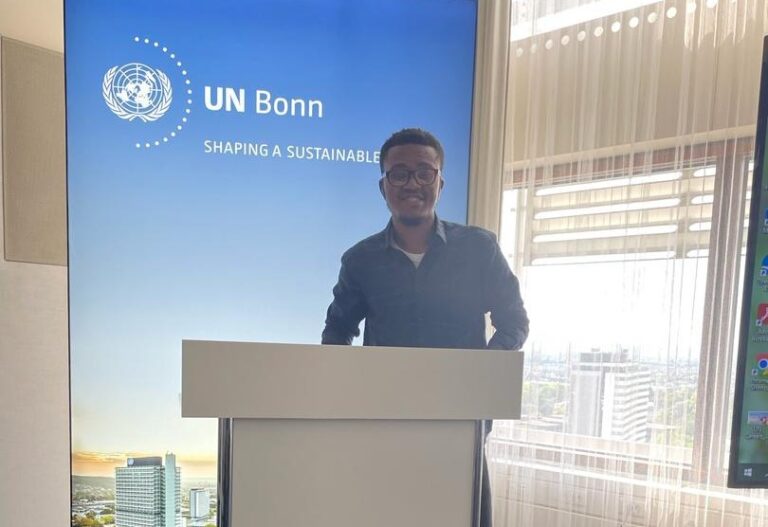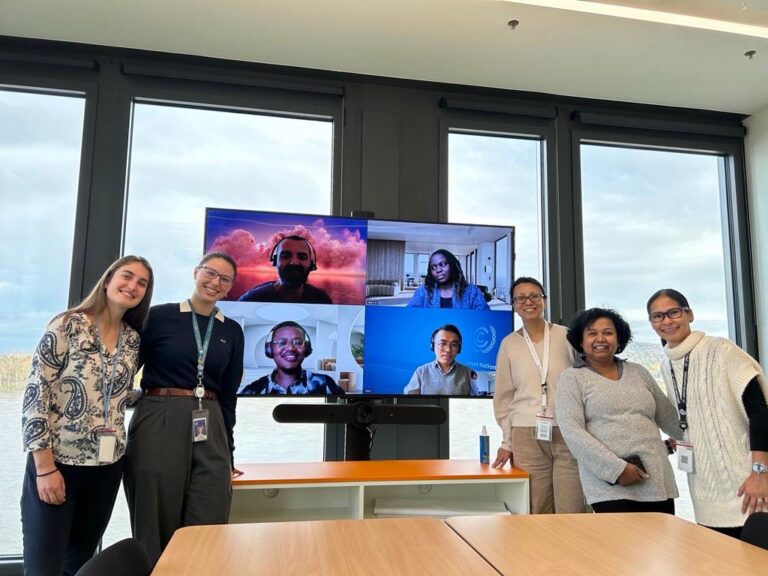My research internship at the United Nations Framework Convention on Climate Change (UNFCCC) was a transformative experience filled with profound reflections, new knowledge, and invaluable lessons for integrating local communities and indigenous voices into climate action. I recall that my first interaction with the United Nations Climate Change Secretariat was during the 2022 African Climate and Environment Center – Future African Savannas (AFAS) Summer School in Germany. This visit was an exciting opportunity to acquaint myself with the various United Nations (UN) bodies particularly involved in climate change issues, one of which was the UNFCCC. Enthused by the interesting insights shared, and fast-forward to a year after, I would be presented the opportunity to complete a six-month internship in the Adaptation Division of UNFCCC from August 2023 to January 2024. Having pursued knowledge in this field when I took part in the AFAS program and when I was a graduate student of Climate Change Adaptation at the University of Nairobi, Kenya (2021-2023), we could say this background positioned me for success in the internship, which would connect theory to practice.

The internship took place under the Local Communities and Indigenous Peoples Platform (LCIPP) of the Vulnerability Sub-division – a platform that works to ensure that the voices and knowledge of local communities (LC) and Indigenous Peoples (IP) are heard and integrated into international climate policies, initiatives, and overall climate change process. Meanwhile, the AFAS-program, with its focus on the Science-Policy-Practice-Interface, is a prime example of how local knowledge and scientific expertise can be combined to enhance climate adaptation in Africa’s savannas. My internship at the LCIPP mirrored this very approach on a global scale, thus aligning perfectly with one of the emphasis of the AFAS-program – building capacity and promoting local solutions for climate adaptation. It was indeed an enriching and transformative experience, where I delved into the intricate workings of the UNFCCC, gaining a deep understanding of the climate change process, otherwise known as the UNFCCC process, and its global implications. This was an opportunity to contribute directly to meaningful climate-focused work.
Supporting LCIPP Events: I actively participated online in climate events such as the Pacific Regional Gathering in Australia (October 2023), Arctic Regional Gathering in Norway (October 2023), Korea Global Adaptation Week in Songdo (held from 28 August – 1 September 2023), and in the COP29 LCIPP mandated events (held from 1st to 6th of December 2023), contributing to the planning and execution of these meetings within the LCIPP workstream. I supported the compilation of the Gallery of Indigenous Values and Mindsets for the Korea Global Adaptation Week, and aided the preparation of presentations and reports for these meetings. Being part of these gatherings was beyond observing; it was about actively shaping the narrative and fostering meaningful dialogue around the invaluable contributions of local communities and Indigenous Peoples in combating climate change.
Research and Knowledge-building: Research was a vital part of my internship. I compiled an ongoing repository of case studies on Indigenous Knowledge systems and practices for climate change adaptation, drawn from research articles, publications, and other materials. For instance, the Sawah Tambak system in Java, Indonesia, integrates rice fields with fish ponds, preventing flooding and drought while supporting biodiversity and local livelihoods. Another example is the Al Tahla Floating Islands of the Ma’dan in Iraq, where biodegradable islands constructed from qasab reeds provide sustainable living solutions. Similarly, the Asi Asi Artificial Islands of the Malaitan in the Solomon Islands, built using coral rock and timber, enhance biodiversity and adapt to sea level changes. These case studies have enriched our understanding of how indigenous wisdom can serve as a beacon of hope in combating the climate crisis, contributing to a valuable knowledge base within our workstream.
Capacity-building and Collaboration: I participated in the preparation and delivery of training sessions and consultations with Indigenous youths and other stakeholders across various sociocultural regions and disciplines. With guidance from my superiors, I prepared PowerPoint presentations and engaged in interactive presentations discussions and hands-on activities. For instance, during the LCIPP training for the International Youth Climate Delegates to COP28, we explained the functions and activities of the LCIPP workstream and how the delegates could contribute to the workplan. Another significant session was the Informal Youth Consultation, which engaged Indigenous youth in planning the focus and modality for COP28. Beyond being part of the LCIPP team, these sessions were enriching for me. These experiences further honed my communication and collaboration skills within a diverse and dynamic environment and deepened my understanding of how COP-related activities are planned and implemented. Witnessing the passion and dedication of these local communities and Indigenous Peoples was a humbling and enriching experience.

Throughout my internship, I had the privilege of working alongside inspiring supervisors and colleagues from different backgrounds and with different expertise. Their guidance and support were instrumental in my learning and professional growth. With this, I am able to draw lessons relevant to the involvement of LCs and IPs in climate action, some of which are shared in the next section of this article.
My time at the LCIPP served as a powerful reminder of the critical role local communities (LC) and Indigenous Peoples (IP) play in addressing climate change. Their deep connection to the environment they live in allows them to understand and adapt to environmental changes in ways that can benefit us all by providing innovative, time-tested strategies for sustainability and resilience that can be applied globally to mitigate and adapt to climate change. Some key aspects of LCs and IPs’ contributions to climate action include:
Preservation of Environmental Knowledge: LCs and IPs possess invaluable knowledge of weather patterns, plant and animal behavior, and natural resource management. The UNFCCC emphasizes that LCs and IPs possess the knowledge and practices needed for the global community to implement and scale-up climate action. (UN Climate Change News, 9 August 2022 – https://unfccc.int/news/how-indigenous-peoples-enrich-climate-action). Their knowledge is not just information; it is sacred to them and woven with the threads of experience and wisdom (IPCC, 2022; Whyte, 2017). According to the Intergovernmental Panel on Climate Change (IPCC) Sixth Assessment Report, “Indigenous Peoples have been faced with adaptation challenges for centuries and have developed strategies for resilience in changing environments that can enrich and strengthen current and future adaptation efforts.” Therefore, integrating this knowledge into climate action strategies is essential for effective adaptation. For instance, the premise that Nature-based Solutions (NbS) should always be locally tailored underscores the necessity of incorporating local environmental knowledge.
Sustainable Practices: Many LC and IP communities have developed intricate systems of land use that prioritize conservation and regeneration. From the rotation of crops to the careful stewardship of forests, these sustainable practices offer more than just solutions; they offer a glimpse into a future where humans and nature thrive in harmony. These practices offer valuable lessons for global climate mitigation and adaptation efforts.
Community-Based Conservation: Often times, the central role of managing protected areas, conserving biodiversity, and protecting the health of ecosystems lie in the hands on these local communities. With their deep-rooted knowledge of local ecosystems, they are able to manage natural resources sustainably, with practices such as traditional land management, agroforestry, and the protection of biodiversity hotspots, which enhance carbon sequestration and preserve vital habitats. Now, imagine that these ecosystems and havens of biodiversity are not just managed by governments or other organizations but by the very communities that call them home.
Moving forward, it is vital to recognize and respect Indigenous rights, upholding their governance systems and traditional knowledge as key climate solutions. Investing in capacity-building programs that empower local communities and foster knowledge exchange can scale up successful approaches. Promoting partnerships and co-management between Indigenous Peoples and external stakeholders, integrating science-policy-practice, will ensure effective and sustainable climate projects. These collaborative efforts will build trust and mutual respect, paving the way for a future where every voice is heard and valued.
References
IPCC, 2022: Summary for Policymakers [H.-O. Pörtner, D.C. Roberts, E.S. Poloczanska, K. Mintenbeck, M. Tignor, A. Alegría, M. Craig, S. Langsdorf, S. Löschke, V. Möller, A. Okem (eds.)]. In: Climate Change 2022: Impacts, Adaptation, and Vulnerability. Contribution of Working Group II to the Sixth Assessment Report of the Intergovernmental Panel on Climate Change [H.-O. Pörtner, D.C. Roberts, M. Tignor, E.S. Poloczanska, K. Mintenbeck, A. Alegría, M. Craig, S. Langsdorf, S. Löschke, V. Möller, A. Okem, B. Rama (eds.)]. Cambridge University Press, Cambridge, UK and New York, NY, USA, pp. 3-33, doi:10.1017/9781009325844.001.
Whyte, K. (2017). What do indigenous knowledges do for indigenous peoples?. Forthcoming in Keepers of the Green World: Traditional Ecological Knowledge and Sustainability, Edited by Melissa K. Nelson and Dan Shilling.
Information about the author:
Lawrence Akpoterai is an AFAS fellow from the 1st master cohort based at the University of Nairobi in Kenya.
(lawrenceakpoterai[at]gmail.com / lawrenceakpoterai[at]students.uonbi.ac.ke)